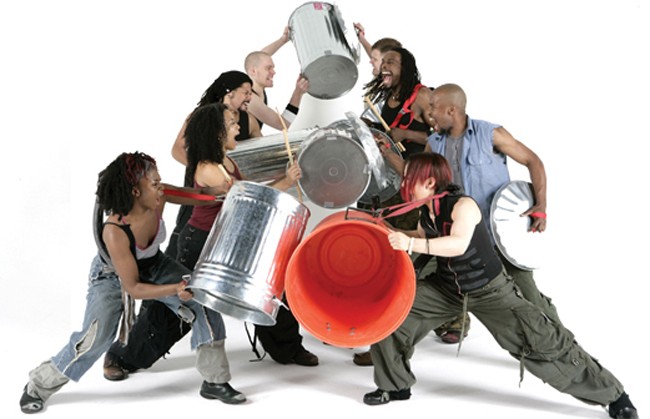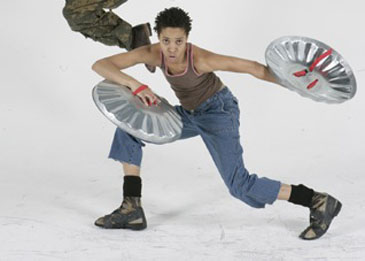CHICAGO – Patrick McDonald of HollywoodChicago.com appears on “The Morning Mess” with Dan Baker on WBGR-FM (Monroe, Wisconsin) on March 21st, 2024, reviewing the new streaming series “Manhunt” – based on the bestseller by James L. Swanson – currently streaming on Apple TV+.
Interview: Donisha Brown on the Enduring Show Legacy of ‘STOMP’
CHICAGO – The dance and percussion show, “STOMP,” part of popular culture for close to 20 years, performs again in Chicago at the Bank of America Theater from April 28th through May 2nd. Donisha Brown, a “co-rehearsal Director” and performance artist in the show for over 11 years, is a crucial part of STOMP’s endurance.
STOMP’s history begins in Britain in 1981, with the creators Steve McNicholas and Luke Cresswell. These street band performers – the act was called Pookiesnackenburger – eventually evolved into the show, which was written and choreographed by Luke as a part of the band’s stage act. The original Stomp debuted at the Edinburgh Festival and London in 1991.
Since that time STOMP has morphed into an international sensation, with touring companies and a Las Vegas revue. Its unique act of using everyday objects for percussion, along with dance movement and physical comedy, has entertained and endured through countless performances and variations.
 Photo Credit: © STOMP |
Donisha Brown, who has been with the troupe since 1998, describes herself as a Co-Rehearsal Director, which is a fancy way of saying she both performs and contributes to the show. HollywoodChicago.com caught up with her, as STOMP comes back to the Windy City.
HollywoodChicago.com: STOMP is described as a skill that anyone with co-ordination can learn and participate in. Is it any easier if you are a certain type of performer such as a dancer or is it so unique that basically an intuitive coordinated type can pick it up more readily?
Donisha Brown: I would say if you are a mover or a dancer, it is something easier to pick up. I don’t think it’s exactly easy, it’s actually pretty difficult to handle strange objects and move and play rhythm all at the same time.
HC: Since STOMP is an ever-evolving animal, what is different about this current production than the previous ones?
DB: We have many new numbers in the show, specifically one called ‘Paint Cans,’ which we are tossing and playing rhythm on that item. It’s really exciting because at any moment the cans can fall on our heads, which they have done before. It definitely keeps the audience guessing.
Another new number is one we call ‘Donuts,’ but they are actually tractor size inner tubes that we wear on our bodies and play like Taiko drums, which is a Japanese method of drumming. That one is really fun.
And all of the numbers that people have grown to love about STOMP like the opening number where we play brooms and the number with trash cans – all of these have been reworked. Coming to this show is like seeing a brand new show.
HC: Is the standard show that started it all still essentially being done, or has the concept evolved so much that we wouldn’t recognize the original show in the current one?
DB: You totally recognized the original show. One thing that STOMP has always stuck to is its integrity and its roots. If you saw the show in 1991, when it first came out, and then saw it again now, you would recognize it. But you would also see how its changing with the times, something that is always growing and staying relevant.
HC: What is distinctive about STOMP’s British roots that makes it an art form particular to that culture, or could STOMP have been invented anywhere?
DB: There is a grittiness and a wittiness, kind of tongue and cheek, that is very, very British. That is one thing we’ve always tried to keep in the show. There is a flash to the show, but it’s not flashy by any means. It’s definitely working class, gritty, dirty and that is what the creators Luke and Steve wanted in the show and that we’ve always kept. It came from a busking [street performance] background and you still see that in the show.
HC: The ‘language’ of STOMP is its unique percussive expression, and universal. Since STOMP has played all over the world, which countries connect to it the most and why?
DB: I think there isn’t one country that connects to it any more than others. I think rhythm is something universal and goes through every culture, everybody has a heart beat. Rhythm is something that everyone understands, everyone speaks that language.
So we might go to a country that we think has a ton of rhythm, like Brazil. How they appreciate the show might be different, they might be a little more louder or more inclined to jump right in and participate. Whereas when we go to someplace like Japan those audiences are a bit more reserved, they are listening and listening. So the whole show we’re saying ‘do they like us?’ And then when the show is over we get an eight minute standing ovation. It truly crosses all cultures, crosses all boundaries, because rhythm is something we all truly understand.
HC: Besides the theater arena, which outside media project do you think people remember STOMP for the most, and what in that work made it so memorable?
DB: We haven’t done many outside projects. We do charity events, like the one in Rome a couple years ago that Quincy Jones produced. I think people know the show from either seeing it in the theater or the HBO special.
 Photo credit: © STOMP |
HC: How do you modify STOMP for different venues? What makes STOMP in Las Vegas different from a touring company in Chile, for example?
DB: The STOMP show in Las Vegas is a different show. It’s called ‘STOMP OUT LOUD,’ by the creators of STOMP and I was part of that cast. It was bigger and grander, instead of eight people being on stage, it was sixteen. We had a huge water section where it would rain on stage. We had this gigantic roulette wheel that would spin during portions of the show, so everything was much bigger. It was a fantastic show. The touring show is like STOMP in its original, classic form.
HC: In the history of STOMP, what common objects used in the show have been acknowledged to make the most amazing sounds? Is it true that in this long history that everything has been ‘stomped’ to see the result?
DB: It depends on your preference. We have people who love it when we play the trash cans. Then there is a portion of the show where we’re using PVC pipes and they’re all cut to different length to produce a melody.
My favorite number is ‘Bags.’ It’s a trash bag, and we pull out different objects, and we try to make music from the stuff we pull out. That for me is the most fun. But everything on set is playable.
HC: Since STOMP has such a international influx and influence, how do you think it has changed performance culture in general?
DB: It has opened up possibilities of what people can do, and what people are interested in seeing. It has also opened the door for different types of people to come to the theater. We definitely have a show that everyone can come and enjoy, you can literally bring the whole family and have a great time. It can also be a date night, a guys or girls night out, it’s just one of those shows that is just not geared to one particular type of person. And we always have ticket prices at a level where more people can come to the theater, we want to open up our production to as many people as we can.
The idea that you can take something so simple as a broom and turn it into an instrument. The idea that something ordinary can be something extraordinary, it’s just a great idea. It made theater accessible to all people, I think that is one of the other great things that STOMP has done.
Click here for ticket information.
 | By PATRICK McDONALD |


